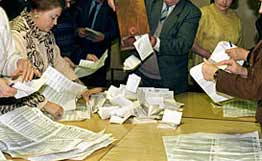
AZERBAIJAN’S ELECTORAL CAMPAIGN: FREER, FAIRER, AWAITING FAIR JUDGMENT
AZERBAIJAN’S ELECTORAL CAMPAIGN: FREER, FAIRER, AWAITING FAIR JUDGMENT
Images of baton-wielding police breaking up unlawful rallies by the radical opposition in a central square of Baku are partly responsible for diverting international attention from Azerbaijan’s genuine advances toward holding freer and fairer elections. The other distracting factors include local authorities’ uneasy learning process about modern multi-party elections, as well as the radical opposition’s strategy to compensate for its low popularity ratings in the country by gaining international media headlines and op-eds. That strategy also serves to relegate Azerbaijan’s moderate, non-“revolutionary” opposition parties to undeserved obscurity.
Given Azerbaijan’s lack of any historical experience with democratic elections, and its all-too-recent experience with violent destabilization, Western mentoring at times falls out of correlation with a realistic level of expectations. Azerbaijan’s leadership explained to international organizations and Western governments at the outset of this campaign that it could not promise a perfect election, but that it does promise a freer and fairer election compared to the preceding ones. This commitment is clearly being fulfilled thus far.
The Electoral Commissions registered some 2,200 candidates to compete for the parliament’s 125 seats (all in single-mandate constituencies) by the September 6 registration deadline. In contrast to previous elections when the registration process was in some cases used against opposition candidates, this time the registration was completed smoothly and with almost no complaints from the opposition. The multi-candidate contests seem too complex to be centrally controlled by either the government or the opposition blocs. In most constituencies, candidates from pro-government groups compete against each other, as do candidates from one and the same opposition bloc, not to mention rival opposition blocs.
Following international intercession, President Ilham Aliyev amnestied seven high-profile opposition activists in June at the outset of the campaign, despite their convictions for past involvement in violence or anti-constitutional activities. Aliyev argued that the broad popular consensus for stability made it possible for the authorities to release these individuals without undue risks.
A public television channel has been established, alongside the state-controlled and independent channels. All television channels are saturated with electoral advertisements — both paid and gratis, in accordance with the electoral legislation — for blocs, parties, and the individual candidates. Although the authorities do capitalize on the incumbency advantage, the opposition’s broad access to television is a far cry from the situation in previous electoral campaigns.
Demonstrations, banned in Baku following the Musavat-instigated violent riots in Azadliq Square in October 2003, have again been authorized since June of this year. A controversial ban on the sale of opposition newspapers in the Baku subway was lifted at the same time. The authorities have made available five squares, all in downtown Baku, for opposition demonstrations. However, radical opposition leaders insist on conducting demonstrations in Azadliq Square and another unauthorized point. This has sparked almost regular Sunday clashes between opposition groups and the police — a situation that has played into the opposition’s hands internationally.
Again in contrast to the irregularity-filled past elections, the compilation of voter lists seems to have been largely accurate this time, and is certainly open to checking by voters and election watchers. The Electoral Commissions have posted the voter lists on the Internet.
Azerbaijan’s government has invited some 1,500 international observers to the elections — an unusually high number for a country with 4,500 voting stations. In addition, the amended electoral legislation allows numerous local observers representing political parties and individual candidates to watch the balloting and vote counting. Ballot box stuffing or deliberate miscounting is unlikely to occur in any significant measure amid such precautions.
For the first time in Azerbaijan, exit polls will be conducted. The United States Agency for International Development is funding an exit poll at more than 1,000 voting stations. The authorities are confident that exit poll results would corroborate the expected overall success of the Yeni [New] Azerbaijan Party candidates. President Ilham Aliyev’s and YAP’s consistently high ratings in public opinion surveys seem to presage a clear overall success.
In previous elections, local officials tampered with the vote count in order to inflate the government candidates’ victory margins, although these would in any case have been clear-cut. That practice cast unnecessary doubts on the legitimacy of election returns and enabled the opposition — which was squarely losing in any case — to cry fraud. Ilham Aliyev warned local officials against resorting to that practice when he ran for president in 2003; but his warnings did not seem to convince some of those provincial officials, in whose mind an actual victory with 60% or 70% of the vote does not look good enough and needs to be inflated to 80%. The president has redoubled those warnings in the run-up to these parliamentary elections.
(Survey based on election campaign coverage by the ANS, Turan, Trend, and AzerTaj news agencies and the ANSTV and ITV channels, as monitored by BBC’s Global Newsline, September-October 2005)


